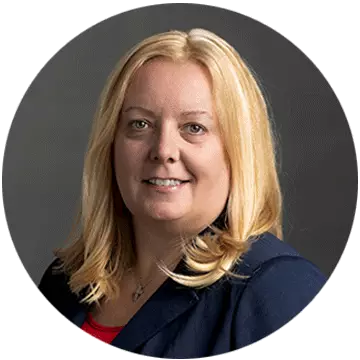How to upskill for tomorrow

Written by Elizabeth Exline

Reviewed by Doris Savron MBA, Vice Provost of Colleges, Assessment and Curriculum

If variety is the spice of life, then options are the lifeblood of education. Today’s job market increasingly demands continuous learning , which makes having multiple pathways to skill acquisition a must-have rather than a nice-to-have.
Some professionals tout the efficacy of workshops in this regard. With a narrow focus and a small group, workshops can be an effective way to learn about a new technology or fine-tune an existing skill.

Haley Foutch
Product Manager
University of Phoenix, however, takes a slightly different approach with self-led, self-paced skill modules that are known as professional development. The modules and pathways are not traditional workshops, notes Product Manager Haley Foutch, but rather concentrated learning opportunities that focus on career-relevant skills participants can use immediately.
“Professional development learning is designed to be highly applicable to the workplace,” Foutch says. “Learn it today and use it tomorrow. … [It’s] typically taken with a goal of quickly improving a skill that you need in a current or future role.”
Here’s a closer look at how professional development works at University of Phoenix.
An overview of professional development
University of Phoenix offers professional development in the following areas:
- Artificial intelligence
- Diversity, equity, inclusion and belonging (DEIB)
- Human resources
- Information technology
- Leadership development
Learning opportunities are offered not as classes or courses but modules. Each module can be completed in approximately one hour and aligns to one skill.
Some modules are combined in what’s called a skill pathway for in-depth exploration of a specific skill set. Pathways generally include four to six modules. All options are market informed, meaning that UOPX relies on data from multiple sources, including Lightcast , to identify which topics or skills are relevant to the labor market, Foutch explains.
Professional development programs are web-based and self-led. There are no deadlines or assignments, so participants can start or stop on their schedule, and they have one year from time of purchase to complete the module or pathway.
Each module consists of information delivered via text and video. Each skills pathway, meanwhile, allows participants the opportunity to earn a certificate of completion and at least one digital badge after completing their final assessment with a grade of 85% or higher. It’s important to note this is not a credit-bearing certificate or certification, both of which are separate educational outcomes for different offerings.
Eligibility criteria
At University of Phoenix, anyone 18 and older in the U.S. or its territories (excluding California) can take a skill module or pathway; no prior degrees or certifications are required.
As the skill modules and pathways are not credit-bearing and can’t be applied to a degree program, they are not eligible for federal financial aid. Some employers, however, may cover the cost for qualified workers. Additionally, some skill pathways provide industry certification preparation, Foutch notes. If the participant passes those certifications, UOPX and other institutions may count those certifications as credits, although there no guarantees.
Whether a participant pays out of pocket or with employer dollars, one question remains the same: Which skill or skills would most benefit you in your career?
“If I were an individual saying, ‘I know I need to upskill, but where should I start?’ I would first look at where I’m least comfortable in my current job, or look at the qualifications I need to build for the next position I want,” Foutch says.
Another key indicator? Reflect on your recent performance reviews to see where you can improve or grow.
Benefits of professional development
Since UOPX’s professional development offerings are rooted in career-relevant skills, participants can gain demonstrable and valuable skills at their own pace and on their own terms.
There are other advantages as well. Professional development acts as a complement to traditional degree programs. So, if you have a bachelor’s degree and want to upskill quickly, a skill module or pathway might be a good option. It can be a bridge to pursuing a master’s degree later, or it can simply complement your professional experience and educational background.
Professional development can also benefit career changers . “If you’re considering an IT career, and you take a four-hour professional development pathway in tech and you hate it, you might want to look into something else,” Foutch says.
Then there is the usability factor. Professional development at UOPX prioritizes practical knowledge and skills that participants can use right away. This is not only useful in the immediate sense but also helps participants retain that knowledge.
“Any kind of learning retention is a challenge, but if you’re applying it right away, then you’re more likely to be able to remember that,” Foutch says.
Popular options
While UOPX’s professional development options are intentionally curated, some options are especially popular.
“Pathways that fall within leadership and communication are most popular,” Foutch says, “such as Elements of Effective Business Communication and Brave Conversations in the Workplace. We also have some pathways that provide recertification credits for SHRM ® and HRCI
® that are popular as well. These are Human Resources: A Pragmatic Approach to DE&I and Business Acumen for Human Resource Professionals.”
Leadership, DEIB and that perennial favorite of virtually every industry — communication — are all topics preferred among many professionals, Foutch adds.
How to register for skills modules and pathways
While UOPX often teams up with companies to provide professional development opportunities to large workforces, individuals can also elect to take modules and pathways that appeal to them. There are no deadlines or start dates, nor are there additional fees. Required materials can be accessed within each skill module.
The one exception is the medical billing and coding pathway, which requires the purchase of three books to prepare to take the National Healthcareer Association’s certification exam.
Some pathways like the medical billing and coding option are more time-intensive, but generally speaking, the modules are a relatively quick way to upskill.
They’re also accessible. To register, participants simply need to purchase through the University’s online professional development skills center .
“If you’re trying to decide what your next step should be, this is such a small commitment and a small amount of time — typically one hour of learning — it’s enough for you to say, ‘You know what? This is interesting.’ You can put these things on your resumé and you’re showing employers that you’re invested in professional growth,” Foutch says.
Pausing, she adds, “Continuous learning is almost a fact of life at this point.”
Thank goodness then for options.
SHRM is a registered trademark of Society for Human Resource Management.
HR Certification Institute is a registered trademark of HR Certification Institute.

ABOUT THE AUTHOR
Elizabeth Exline has been telling stories ever since she won a writing contest in third grade. She's covered design and architecture, travel, lifestyle content and a host of other topics for national, regional, local and brand publications. Additionally, she's worked in content development for Marriott International and manuscript development for a variety of authors.

ABOUT THE REVIEWER
Doris Savron's career spans 30 years in leadership positions in healthcare, information technology and academia. As vice provost for colleges, assessment, and curriculum at University of Phoenix, she oversees strategy for degree, certificate and course offerings, curriculum design and student learning outcomes. She was recently appointed to the board of directors for Career Connectors where she works to empower career seekers and organizations with market insight and high-caliber coaching.
This article has been vetted by University of Phoenix's editorial advisory committee.
Read more about our editorial process.
Read more articles like this:



